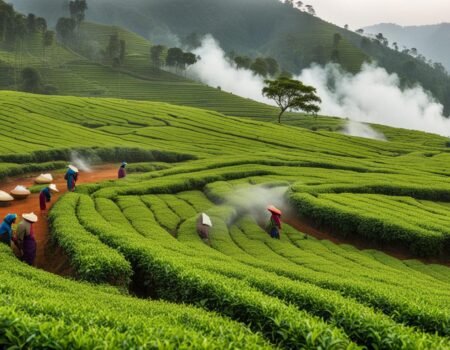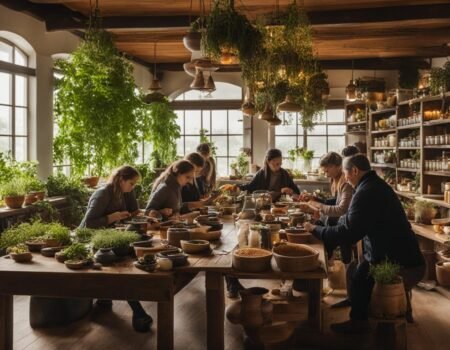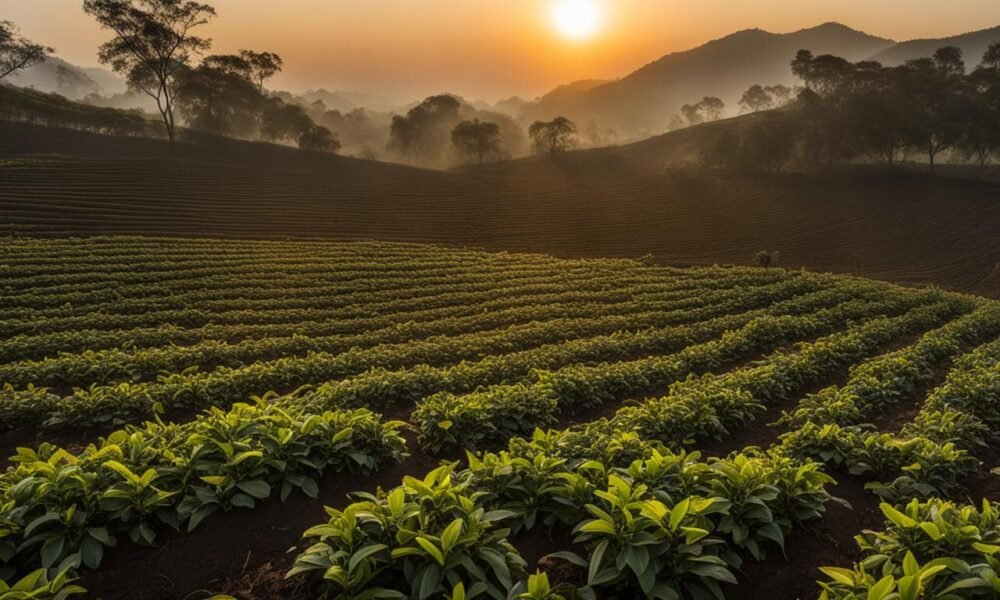
Addressing Challenges in Global Tea Production
Welcome to our latest article, where we dive deep into the challenges faced by the global tea industry. From overcoming farming obstacles to dealing with the impact of climate change, the tea production landscape is constantly evolving. But fear not, we’re here to shed some light on these issues and explore ways to address them. So grab a cup of your favorite tea and join us on this journey!
Key Takeaways:
- Tea production faces various challenges on a global scale, including climate change and farming obstacles.
- Supporting small growers and building sustainable supply chains is vital for the future of the tea industry.
- The well-being of tea production workers and fair wages are crucial considerations in the industry.
- Engaging younger generations and adapting to market changes are essential for the sustainability of tea farming.
- Climate change poses significant threats to tea production, emphasizing the need for climate-smart agriculture practices.
The Well-being of Tea Production Workers and Low Wages
Addressing the well-being of tea production workers is a crucial challenge facing the tea industry. Many workers in tea farms around the world face low wages and poor living conditions, which can have a significant impact on their quality of life. Improving labor standards and ensuring fair wages are essential steps towards creating a more equitable and sustainable tea industry.
The economic challenges in tea farming further compound the issue of low wages. Many tea farmers struggle to earn a stable income due to factors such as fluctuating tea leaf prices and high production costs. This not only affects the livelihoods of tea farmers but also poses a threat to the long-term viability of tea production.
Empowering tea farmers through fair pricing mechanisms and providing support for sustainable farming practices can help address these economic challenges. By enabling tea farmers to cultivate high-quality tea and obtain fair prices for their products, we can create a more economically sustainable tea industry that benefits both the farmers and the broader supply chain.
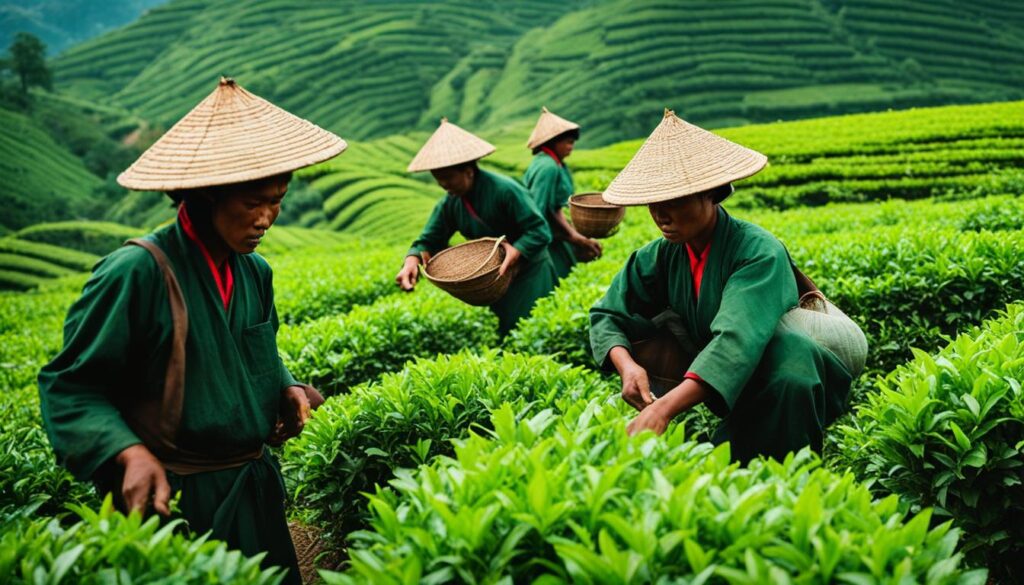
“Improving labor standards and ensuring fair wages are essential steps towards creating a more equitable and sustainable tea industry.”
To optimize production costs without compromising quality, tea businesses can explore innovative strategies such as adopting technology-driven solutions and implementing efficient farming practices. By finding ways to reduce production costs while maintaining the integrity of the tea product, tea businesses can improve their competitiveness and contribute to a more resilient tea industry.
Key Takeaways:
- Low wages and poor living conditions are pressing challenges for tea production workers.
- Economic challenges, such as fluctuating tea leaf prices and high production costs, impact the overall viability of tea farming.
- Fair pricing mechanisms and support for sustainable farming practices can help improve the well-being of tea farmers and contribute to a more economically sustainable tea industry.
- Optimizing production costs while maintaining product quality is vital for the long-term competitiveness of tea businesses.
Adapting Tea Farming to Market Changes
The declining interest in tea production, particularly among the younger generation, poses a significant challenge to the sustainability and future of the tea industry. To ensure its long-term viability, it is essential to adapt tea farming practices to market changes and engage younger generations in the industry.
One way to address this challenge is by showcasing the versatility and innovation of tea. By promoting tea as a trendy and modern beverage, we can attract the attention of younger consumers who may be more inclined to explore and participate in tea production. Emphasizing the health benefits and unique flavors of different tea varieties can also capture their interest and curiosity.
Furthermore, incorporating technology into tea farming can make it more appealing to the younger generation. Implementing precision agriculture techniques, such as using drones for crop monitoring and analysis, can enhance efficiency and productivity in tea cultivation. This integration of technology not only improves operational processes but also aligns with the preferences of tech-savvy millennials.
Table: Tea Varieties for Modern Palates
| Tea Variety | Flavor Profile | Suggested Brewing Method |
|---|---|---|
| Matcha Green Tea | Bold, grassy, umami | Whisk 1-2 teaspoons of matcha powder with hot water |
| Oolong Tea | Floral, fruity, toasty | Steep 1-2 teaspoons of leaves in hot water for 2-3 minutes |
| Hibiscus Tea | Tart, fruity, refreshing | Steep 1-2 teaspoons of dried hibiscus petals in hot water for 5 minutes |
| Rooibos Tea | Sweet, nutty, caffeine-free | Steep 1-2 teaspoons of leaves in hot water for 5-7 minutes |
“Tea is not just a traditional drink; it’s a canvas for creativity and innovation. By embracing modern flavors and brewing techniques, we can entice the younger generation to explore the world of tea.”
- Host tea tasting events and workshops targeted at young adults.
- Collaborate with social media influencers and bloggers to create engaging content about tea farming and its connection to sustainability.
- Introduce interactive educational programs in schools to raise awareness about tea production and its cultural significance.
By adapting tea farming practices to market changes and engaging the younger generation, we can revitalize the tea industry and ensure its continued success. Together, we can create a future where tea farming thrives and tea remains a beloved beverage for generations to come.
Effects of Climate Change on Tea Production
Climate change poses significant challenges to tea production, with its impact felt in various aspects of cultivation. Unpredictable weather patterns and increased pest and disease pressure are just a few examples of the environmental challenges that tea farmers face. As temperatures rise and rainfall patterns become erratic, farmers are finding it increasingly difficult to predict and plan for their harvests.
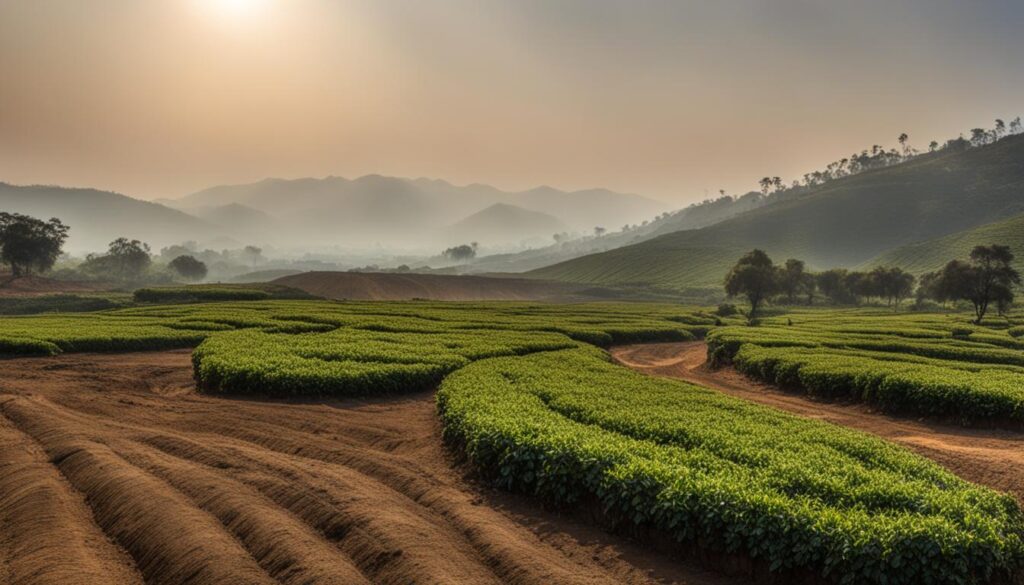
To mitigate the effects of climate change and ensure the long-term viability of tea farms, it is crucial to adopt climate-smart agricultural practices. One such approach is improving soil and water management techniques, which can help tea plants withstand extreme weather conditions. Promoting biodiversity on tea farms is another strategy that can enhance the resilience of tea crops, as diverse ecosystems are better equipped to cope with environmental fluctuations.
Furthermore, embracing renewable energy sources can reduce greenhouse gas emissions from tea production and contribute to a more sustainable future. By utilizing solar or wind power for processing tea leaves, the carbon footprint of the industry can be substantially reduced.
Innovative Strategies for Climate Change Adaptation
Some tea-producing regions around the world have already begun implementing innovative strategies to adapt to the challenges posed by climate change. For example, in Darjeeling, India, farmers are experimenting with shade trees to protect tea plants from excessive heat and sunlight. This practice helps create a microclimate that mimics the cooler conditions required for high-quality tea production.
Additionally, research and development efforts are underway to breed tea varieties that are more resilient to climate change-induced stressors. These new cultivars are being designed to withstand higher temperatures, droughts, and increased pest pressures, allowing farmers to continue producing tea in the face of a changing climate.
| Climate Change Impact | Challenges | Adaptation Strategies |
|---|---|---|
| Unpredictable weather patterns | Difficulty in harvest planning | Adopt climate-smart agricultural practices |
| Increased pest and disease pressure | Threat to tea crops | Promote biodiversity on tea farms |
| Extreme temperatures | Risk to tea plant health | Experiment with shade trees and microclimates |
| Water scarcity | Difficulty in irrigation | Improve soil and water management techniques |
“Climate change is a significant threat to tea production, but by implementing innovative strategies and embracing sustainable practices, we can ensure the long-term viability of tea farms and protect this beloved beverage for future generations.” – Tea Industry Expert
Sustainable Solutions in Tea Production
When it comes to ensuring the integrity of tea products, sustainable solutions play a crucial role. As the demand for tea continues to grow, it is essential to prioritize sustainable sourcing and production methods. By doing so, we can not only maintain the quality and authenticity of tea but also contribute to environmental conservation.
A key aspect of sustainable tea production is obtaining certifications such as USDA Organic, Fairtrade, and Rainforest Alliance. These certifications provide standards and guidelines for sustainable practices, ensuring that tea is grown in an environmentally friendly and socially responsible manner. By supporting brands that adhere to these certifications, consumers can make a positive impact and encourage the tea industry to prioritize sustainability.
“Sustainable sourcing and production methods are not only essential for the future of the tea industry but also for the well-being of the planet.”
However, it is not just the responsibility of brands and consumers alone. Collaboration across the tea industry is crucial in finding innovative solutions. This can involve initiatives such as promoting biodiversity, improving soil and water management, and adopting renewable energy sources. By working together, we can overcome the challenges faced by the tea industry and create a more sustainable future.
The Benefits of Sustainable Tea Production
Sustainable tea production offers numerous benefits that go beyond preserving the environment. It also supports the livelihoods of tea farmers by ensuring fair wages, improving labor standards, and empowering growers. By prioritizing sustainability, we can contribute to economic stability and create a more equitable tea industry.
| Sustainable Solutions | Benefits |
|---|---|
| Adoption of climate-smart agriculture practices | Helps tea farmers adapt to the effects of climate change, ensuring long-term viability |
| Support for certifications such as USDA Organic, Fairtrade, and Rainforest Alliance | Ensures environmentally friendly and socially responsible tea production |
| Promotion of biodiversity | Enhances ecosystem health and resilience, contributes to the preservation of natural habitats |
| Improvement of soil and water management | Optimizes resource use, reduces environmental impact, and enhances soil fertility |
| Adoption of renewable energy sources | Reduces carbon footprint and dependence on non-renewable energy |
By embracing sustainable solutions in tea production, we can preserve the rich heritage of tea, support the well-being of tea farmers, and protect the environment for future generations. Together, let’s make a difference in the tea industry and create a more sustainable and vibrant future.
Global Tea Industry Challenges
As we delve deeper into the world of tea production, we uncover a multitude of challenges that the global tea industry faces. These challenges range from labor issues and climate change to declining interest in tea production among the younger generation. Through this exploration, we aim to shed light on these challenges and uncover potential solutions that can contribute to a more sustainable and resilient tea industry.
The Lack of Awareness and Knowledge
One significant challenge faced by the tea industry is the lack of awareness and knowledge among consumers. While there is a growing interest in tea and its health benefits, many consumers are unaware of the labor and environmental issues faced by tea farmers. Initiatives such as Fairtrade and Rainforest Alliance certifications aim to address these challenges, but there is still a gap between the promises of these certifications and their actual impact.
“Increased education and awareness about tea production issues can empower consumers to make informed choices and support sustainable and ethical tea brands.”
The Declining Interest Among the Younger Generation
Another challenge is the declining interest in tea production, particularly among the younger generation. It is crucial for younger generations, especially in tea-producing countries, to embrace tea farming and its heritage. By adapting tea farming practices to market changes and engaging the younger generation, we can ensure the long-term viability of the tea industry.
The Effects of Climate Change
Climate change presents a significant challenge to tea production. Unpredictable weather patterns and increased pest and disease pressure threaten tea farming regions worldwide. Adopting climate-smart agriculture practices, such as improving soil and water management and promoting biodiversity, can help tea farmers adapt to climate change and ensure the sustainability of their farms.
Maintaining Ingredient Integrity
Ensuring ingredient integrity in tea products is paramount for the industry. With the increasing demand for sustainable and ethical practices, brands and consumers must prioritize sustainable sourcing and production methods. Certifications such as USDA Organic and Fairtrade provide standards and guidelines for sustainable tea production, supporting the quality and authenticity of tea products.
Conclusion
In conclusion, the global tea industry faces a range of challenges in production, labor, and maintaining ingredient integrity. However, there are sustainable solutions available that can help overcome these issues and create a more resilient tea industry.
One of the key areas where sustainable solutions can make a difference is in the supply chain. Tea industry supply chain problems, such as poor labor conditions and unethical sourcing practices, can be addressed by promoting fair labor standards and supporting certifications like USDA Organic and Fairtrade. By prioritizing these certifications, we can ensure that tea production is conducted in an environmentally friendly and socially responsible manner.
Another crucial aspect of sustainable tea production is implementing climate-smart agriculture practices. Climate change poses significant challenges to tea farmers, including unpredictable weather patterns and increased pest and disease pressure. By adopting climate-smart practices such as improving soil and water management and promoting biodiversity, tea farmers can adapt to these challenges and ensure the long-term viability of their farms.
To create a more sustainable future for tea production, it is also important to increase awareness and education about the issues faced by tea farmers. By informing consumers about the labor and environmental challenges in tea production, we can empower them to make conscious choices and support brands that prioritize sustainability. Together, we can work towards a tea industry that is both environmentally sustainable and socially responsible.
FAQ
How does climate change impact tea production?
Climate change leads to unpredictable weather patterns and increased pest and disease pressure, making it difficult for farmers to plan and predict their harvests. Mitigating the effects of climate change and adopting climate-smart agriculture practices are essential for the sustainability of tea farms.
What are the challenges faced by tea production workers?
Tea production workers often face low wages and poor living conditions. Addressing these challenges is crucial to ensuring fair wages and improving labor standards in the industry. Fair pricing mechanisms and empowering farmers can contribute to a more stable income for growers and encourage the cultivation of high-quality tea.
How can the younger generation be engaged in tea production?
There is a declining interest in tea production, especially among the younger generation. Adapting tea farming practices to market changes and engaging younger generations in the industry is essential for its long-term viability. It is crucial for younger generations to embrace tea farming and its heritage, particularly in tea-producing countries like Japan.
How can the integrity of tea ingredients be maintained?
Brands and consumers should prioritize sustainable sourcing and production methods to ensure the quality and authenticity of tea products. Certifications such as USDA Organic, Fairtrade, and Rainforest Alliance provide standards and guidelines for sustainable tea production. By supporting brands that adhere to these certifications, consumers can contribute to sustainable tea production and environmental conservation.
What is the lack of awareness and knowledge about tea production issues?
Despite the growing interest in tea and its health benefits, many consumers in the United States are not familiar with the labor and environmental issues faced by tea farmers. Increased education and awareness about tea production issues can empower consumers to make informed choices and support sustainable and ethical tea brands.





